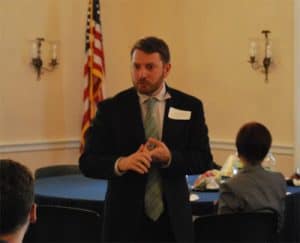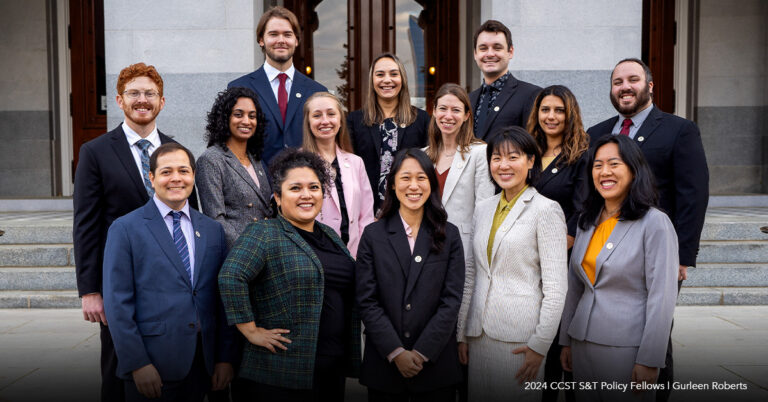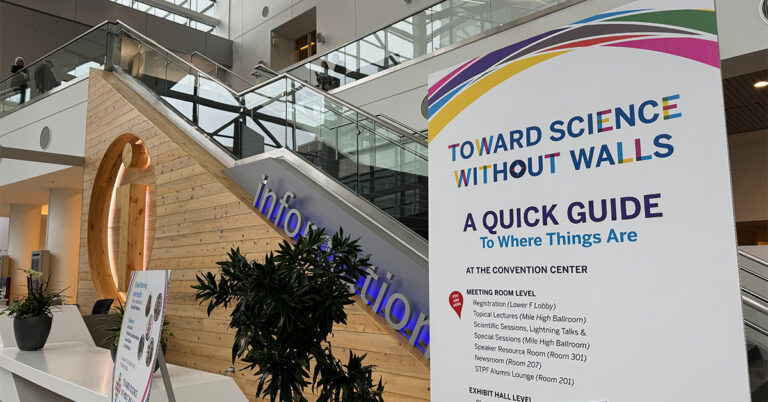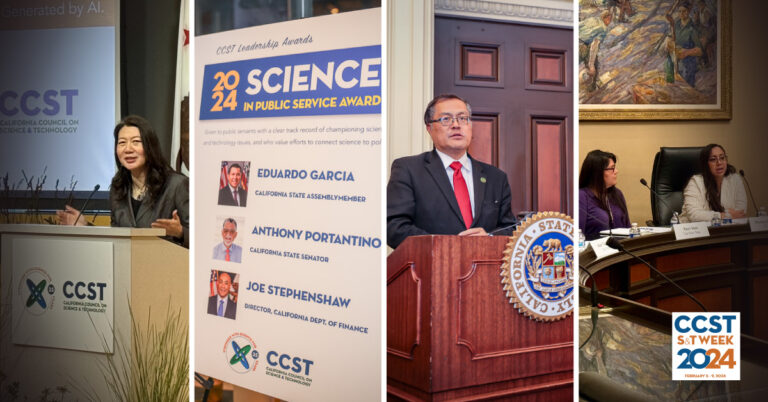Update: Applications for the CCST Science & Technology Policy Fellowship Have Closed
Cal TAC Briefs Legislators in D.C. on Digital Education Work
February 1, 2013 | CCST Newsroom | Contact: M. Daniel DeCillis

A delegation from the California Teacher Advisory Council (Cal TAC) spent three days in Washington, D.C. last week, introducing Cal TAC as an organization dedicated to strengthening STEM teaching and learning throughout California, and briefing Senate staff and Congressional members about their current work on digitally enhanced education.
The delegation included Cal TAC Chair Brian Shay, Canyon Crest Academy, San Diego; Cal TAC alumna Suzanne Nakashima, of Lincrest Elementary School, Yuba City; and Cal TAC alumna Peg Cagle, who recently served as Albert Einstein Distinguished Educator Fellow in the office of Senator Kirsten Gillibrand, as well as CCST Senior Education Policy Advisor Margaret Gaston.
“These briefings were a terrific opportunity to connect with members of Congress and engage in a continuing dialog on the ways in which science and math could be made engaging and accessible to more students, while at the same time ensuring high quality tools, content and instructional practice,” said Shay.
Cal TAC was formed by the California Council on Science and Technology (CCST) in 2005 as a means for bringing real world classroom experience – the wisdom of practice – to policy makers and others whose decisions affect the quality of science and math education in California schools. Cal TAC is comprised of a carefully selected group of award winning, highly accomplished teachers from across the state, Cal TAC has been working to provide greater opportunities for students to engage in the STEM disciplines.
“Classroom practitioners are the ones with firsthand experience of how digitally enhanced education methods are changing the ways in which students learn,” said Congressman Mike Honda (D-California), whose staff met with the Cal TAC group. “It is important that we use their knowledge to evaluate the use of these technologies and understand how they are helping to promote students’ critical thinking and problem solving skills.”
Other offices visited included those of Senator Barbara Boxer, Congresswoman Lois Capps, Congressman Duncan Hunter, and Congressman Mark Takano; Congressman John Garamendi and Congressman George Miller met directly with the Cal TAC delegation as well. The group also met with representatives from the National Academies of Science and the U.S. Department of Education.
Cal TAC’s current work has grown out of a 2011 CCST report, Innovate 2 Innovation (i2i), which identified digital teaching and learning as significant challenges for California to address in order to remain a competitive engine of innovation in the years to come. Following on the i2i work, Cal TAC put forward a framework with specific steps that need be taken to fully implement digitally enhanced education throughout the state.
“We believe that, in order for California to effectively embrace digitally enhanced education, the state must support and enhance the four key pillars of the digital learning process: the classroom environment, the teacher, the institutional infrastructure, and public/private partnerships,” said Shay. “Students today live in a world of iPads, smartphones and social networking, among many other tools. These tools need to be integrated into the mainstream learning environment in a way that effectively enhances the learning process.”
This spring Cal TAC will host a forum on the efficacy of digital teaching and learning; a symposium in the fall will focus on implementation of digital teaching and learning strategies in the classroom. Data and recommendations for strengthening digital teaching and learning from the symposia will form the base of a Tool Kit for education leaders and policy makers to use as they develop statewide frameworks to guide digitally enhanced education.
“As a former high school science teacher and now a policymaker, I applaud CCST for recognizing the importance of having classroom educators informing policy and for institutionalizing this by establishing Cal TAC,” said Congressman Honda. “Including this perspective in education policy making will only make these policies better by ensuring that they are designed with the classroom teacher in mind and that educators are invested in making these policies work.”






